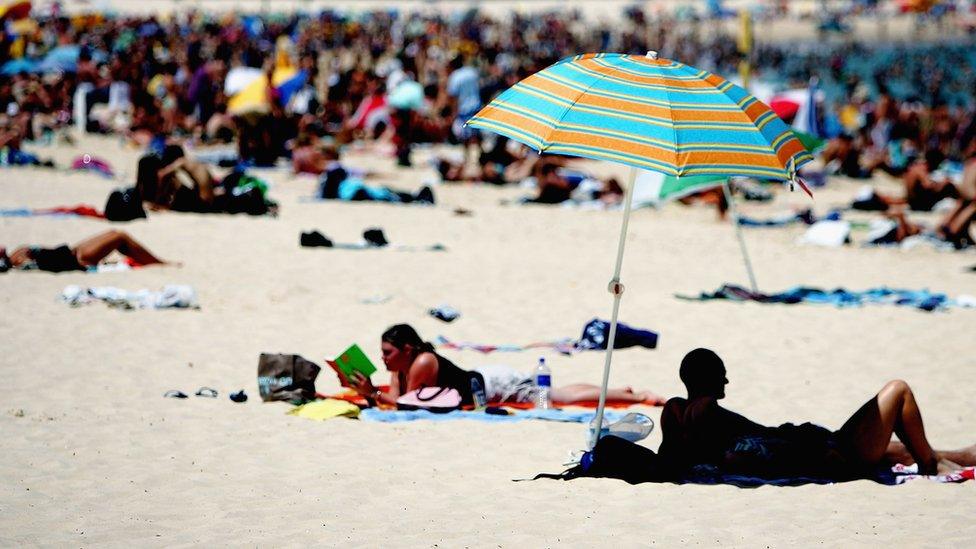Term-time holiday fines are under review in some areas
- Published

Those taking holidays in term time pay less and dodge the crowds
A BBC investigation has found that 35 councils in England have changed their policy on fining parents for term-time holidays.
It follows a successful high court appeal by a father last year against a £120 fine levied by the Isle of Wight.
The case will reach the Supreme Court this week where judges will consider what constitutes regular attendance.
Ministers argue missing days at school has an impact on pupils' GCSEs.
High court victory
Most parents simply pay the fines issued for unauthorised absence from school to avoid prosecution.
But Jon Platt refused after facing prosecution for taking his daughter out of school for a term-time holiday.
He has argued that her attendance was regular because even after the holiday it was over the 90% threshold set out by the Isle of Wight in its policy.
It was an argument the high court accepted.
Term-time holidays 'don't worry teachers'
When I met him recently on the Isle of Wight Mr Platt said he never expected the case to reach the highest court in the land.
While he has fought it on the technicalities of the law, he thinks there is a broader principle at stake.
"Ultimately someone has to have the final say about the days a child goes to school. Is that the state or the child's parents? I think that's what this boils down to."
Since last year he has been contacted by hundreds of parents angry at the cost of holidays and asking advice about fighting fines.
Changed policies
In September 2013 new guidelines came into force in England, making the policy on unauthorised term-time absences the toughest in the UK.
It followed concerns that some families had begun to see going away in term-time as an entitlement.
Now head teachers in England are only able to give permission for a pupil to miss school in "exceptional circumstances."
Each local authority draws up its own policy on what to do with cases that are sent to them and as result of the judgement many have had to look again at the detail.
Term-time holiday: What are the rules?
Holiday outlook - what might change?
The BBC has gathered information from 108 councils and found 35 have changed their policy as a direct result of Jon Platt's case.
A further five are currently reviewing their guidelines and 28 have withdrawn fines issued to parents.
Of the councils that provided information, 22 told the BBC the number of parents taking term-time holidays has increased.
In North Somerset 100 fines have been put on hold while the council considers its policy.
There is a remarkable variation in the number of fixed penalty notices issued to parents.
So while Suffolk issued 6,008 fines in the 2015-16 school year there were just 108 on North Tyneside for example.
Richmond upon Thames issued none in the same period.

Going away during school holidays can cost four times as much as during a term
Lower attainment
Ministers have argued that missing even a few days of school can have a damaging effect, but some have taken issue with how the evidence has been presented.
Last year the Department for Education published research which showed each extra day missed reduced the chances of a pupil gaining 5 GCSEs at grade A-C.
"Nobody should be condoning prolonged absences from school," says Professor Stephen Gorard from Durham University.
But he believes the Department for Education has overstated its case in telling parents that missing just a few days of school for a holiday can damage pupils' chances of getting good GCSEs.
"It's not fair to be that adamant about the link. We know there is an association between lower attainment and missing school - but we conflate all the different causes."
Professor Gorard says many different factors can influence how well a child does, and there is a risk of overestimating the impact of unauthorised holidays.
"One chance"
There is, however, backing for the government's position from many head teachers who say children taking time off scattered throughout the year disrupts teaching.
Sian Carr is President of the Association of College and School Leaders and also Executive Principal at Skinners' Kent Academy in Tunbridge Wells.
"I think your education is very important, you only get one chance at it, and so making sure that you use every single day of that education is vital."
She says the data in her own school clearly demonstrates that children who miss school do less well.
The Supreme Court will consider the arguments on Tuesday but the judges are likely to take months before outlining their decision.
- Published13 May 2016

- Published13 May 2016

- Published13 May 2016

- Published21 December 2016
